A weepy blog post composed of questions:
•One of the most interesting discussions that took place at the ICAF conference I attended a few years ago in White River Junction concerned the question of readers’ emotional responses to comics. I forget who exactly was involved in the discussion but I remember distinctly that there was somewhat of a consensus on the notion that comics are not a spontaneous or passionate medium. One reads comics analytically, obsessively, but not immersively. One rereads comics over and over, and might form intense emotional responses to the stories and characters, but not in the same spontaneous and overwhelming way we might experience when reading novels or watching films. Comics scholars in that room seemed to agree that, generally speaking, it is not common to weep in response to a comic or graphic novel. I mostly agree, although I hope to be proven wrong. The question has been asked many times before, but I ask it again: which comics have made you weep?
•I wept a few times while reading Alison Bechdel’s Are You My Mother? It’s hard to understand why her autobiographical comic moved me to such a great degree when I don’t identify with the author’s alienated relationship to her mother and, more to the point, I find metafictional writing intellectually interesting but not moving in any kind of spontaneous weepy kind of way. So, I’d like to understand, why did Are You My Mother? make me weep (on an airplane, in front of strangers, no less)!? I don’t have an answer to my question but I do have more questions.
•As a gay man, I often find naturalizing maternal/paternal narratives, especially those that involve legacy or inherited guilt/pride/whatever to be silly and alienating; it’s a culture I was violently excluded from, being from a born-again Christian family. At the same time, like anyone, I have inherited various legacies from my family and am as vulnerable as the next person to stories about generational transmission (guilt, abuse, pride, shame, etc.). Usually such stories are intellectually interesting but not moving enough to bring me to tears. My critical capacities shut the schmaltzy response down before it can materialize. I find Wes Anderson films utterly intolerable, even though I admire his artistry, to give you one complicated example. So, the only way I can understand my response to Bechdel’s Are You My Mother? is by comparing it to the very similar emotional response I experienced while watching Almodovar’s All About My Mother. Is it a coincidence that both works are about mothers? Or that both works are intensely metafictional and citational? Am I just being disingenuous about my mommy issues?
•It’s a question I could not get away with asking in a scholarly article, but one worth asking nonetheless: do mothers and metafiction have something to do with one another? Is there something maternal about metafictional structures? Is there something metafictional about the way we relate to our mothers?
•Both Almodovar and Bechdel are interested in acting. Bechdel’s mother is an actress who, at times, plays a mother. Almodovar’s mothers are always actresses who usually play bad mothers. What is it about the mother-as-actress figure that moves me to tears? I suspect it has something to do with Freud’s fort-da, that the mother is somehow both unavailable and eternally available as a representation. Does the fact that mothers can be played by actresses disturb our understanding of motherhood as somehow natural?
•There may be a narratological term for this, and please let me know if there is, but one of the aspects of Bechdel’s and Almodovar’s metafiction I find deeply moving is the deliberate layering effects. Actresses play mothers; mothers play actresses; men play women; women play women. The play within the play is only the beginning. For Almodovar, All About Eve and A Streetcar Named Desire become the grounds for a series of fictional layers (fiction providing the grounds for further fictions), while for Bechdel, it is the works of Virginia Woolf and Donald Winicott, among others, that serve a similar purpose. All of these layers of fiction bring attention to the melancholic unavailability and tragic loss of some kind of original femininity/maternity. The fictional copy brings attention to the fact that the original is not, and has never been, available. Children cope with the unavailability of their mothers (be it a psychological or simply situational unavailability) through increasingly complex layers of transitional objects, all of which enable the child to grasp the reality of absence while also providing comfort in the form of a substitution. These layers are essentially fictions, and I think this might be where we can find a tie-in between metafiction and mother-child object relations. We are all moved by stories that engage mother-child object relations (unless we are psychotics) but why is it that I find myself weeping most weepily in response to stories that construe mother-child object relations in metafictional terms?


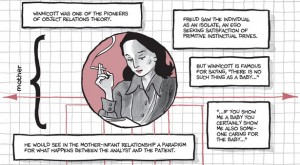
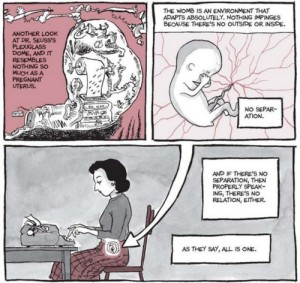
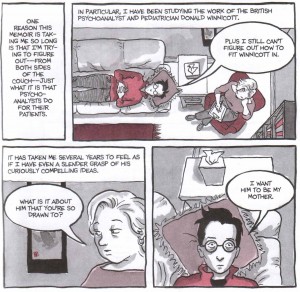
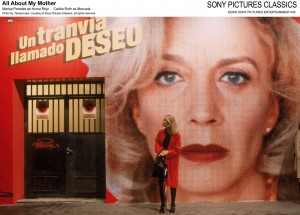

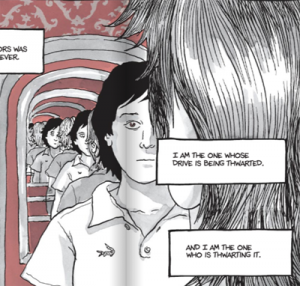
This is the comic like thing that made me weep.
It’s also somewhat metafictional. The distance between story and reality is a good tearjerker.
I can’t think of any comics that have made me actually weep. I have been moved by comics, certainly – and there have been a few scenes in TV and movies that have made me cry (usually father/son stuff – my own issues), but not comics – but I am really loathe to put my personal experience down as indicative of of the inability for comics to be affective in that way. As I am really drawn into comics when I read them, I am more likely to credit my tendency to not cry than the medium. I can’t remember a novel ever making me cry either.
I cannot answer your question about weeping most weepily (though I imagine that the way you intellectualize your feelings means that things like Bechdel’s work would resonate with you), but I take issue with the idea that you could not get away with this question in a scholarly article. There is plenty of scholarly work (and there should be more) that takes the personal as the basis for beginning its inquiry – starting from there and moving outward, but keeping the personal as a kind of touchstone. It is something from the tradition of black feminist writers that I wish would be adopted more broadly – and something I do a little bit of in my own scholarly work (though I am yet to be published, so I won’t say that there isn’t pushback – just that it is possible to “get away with it” depending on your position, style and topic)
It seems like metafictional moves such as what you describe here involve a great deal of emotional intimacy between the text and the reader, opening up not just new levels of awareness but something that might be described as a kind of camaraderie with the characters, with the story… So it doesn’t surprise me at all that you would be moved to tears.
Not metafictional, but the end of Sandman messed me all up. I had to get out the tissues for those last pages.
And I’m with Osvaldo – who says you can’t get away with talking about this in a scholarly article? Especially when it comes to exploring possible links between the maternal and metafictional… that would make for a fascinating piece. I do think that comics studies can sometime go a little overboard in using personal experience to substantiate an argument, but when done well, it can be a powerful strategy (and one that you use to great effect, Michael).
I have no time to respond right now, Michael, but the ICAF paper in question — with the “I have never cried at a comic” opening — was mine. That was a great conference, and it’s nice to remember it.
I really enjoyed this post. I like Qiana’s theory about metafiction allowing for a kind of participation and camaraderie with the characters or story, even a kind of direct emotional appeal — I think this is how the end of Jujitsu for Christ works (in prose), partly because it doesn’t fully reveal itself as a type of metafiction until that final chapter.
On the other hand, I was thinking of the last comic that made me cry, which was probably Jordan Crane’s “Keeping Two,” still being serialized at whatthingsdo.com. There’s a metafictional element — the two main characters are reading a novel about a couple who has lost a child, and the events of that novel are illustrated whenever one of them is reading it or thinking about it. But because of the form of the comic — you just keep scrolling down instead of turning pages, and (depending on your monitor setup, I guess) there are never more than two panels fully visible at any time — I invested in the reality of that in-story story as much or more than I did the frame or “real” story. So the form made it more immersive, not less. Also just parental anxiety. I am generally not quick to claim that I can’t handle watching or reading X now that I have kids — Game of Thrones infanticide doesn’t faze me — but that one got me.
Have you published that ICAF paper, Peter? Like Michael’s post, it sounds fascinating. I’d be interested to read it.
After I read Michael’s post, I tried to remember the first comic that made me cry, and I think it was Matt Wagner’s original Mage series–or its final issues, anyway. For those who haven’t read them I won’t give away the ending, or the fates of the characters, but I think it was the simplicity of Wagner and Sam Keith’s art that made the ending of the series even more devastating for me. Their style was understated and quiet. So, for me, the more spare and simple the art, the more likely I’ll be to cry at an especially emotional scene, like sections of John Porcellino’s Perfect Example. I think for me it’s what Paul Schrader described as an austere “transcendental style,” like the one he finds in Carl Dreyer and Ozu, that will get me crying every time. So when I experience those same silences or absences in comics, I’m likely to get weepy, too.
But some of that emotion might also have to do with the “intense emotional responses” to familiar characters Michael mentions here. I even got weepy this week reading the first two issues of Ms. Marvel, because I could tell I might become attached to the characters in the same way, for example, that I did to some of the X-Men or New Mutants when I was a kid. That sort of emotion feels more like joy, however–a memory of first love, maybe, that first sense of attachment to the form of comics itself.
I kind of am constantly trying to get Peter to write more here, so if he wanted to put that paper on HU, I’d be thrilled.
I actually have a freebie collection of cartoons and strip comics that I keep, I think the title was “Town Crier”, all focused on the idea of crying and sadness. There’s one in it about a woman who eventually grows to have difficulty crying, and every time she needs to “feel sad” and let it out by crying, she rents E.T. In a way, that collection of cartoons became the E.T. for me for a while — There’s no particular reason for me to connect with the subject matter in the cartoons in them, but I’m compelled to feel empathy for these sad little simple cartoons because it feels like there COULD be a connection between myself and them, that I end up expanding in my mind beyond the intent of the writers because cartooning allows so freely for additional meaning to be added by the audience understanding.
I don’t need to use it anymore, but I still keep it.
I’ve been reading a lot more stories about relationships between parents and children, as my own age and sometime in the near future I may have a child. It’s a sort of transient way of understanding the past that is much father away than the future that I cannot yet understand.
I do not weep at art. I have shed too many tears and will cry no more for ever.
Qiana and Osvaldo: I agree 100% that academic writing should be grounded in the personal. My queer heroines are writers like Audre Lorde, Adrienne Rich, and Gloria Anzaldua who did nothing but that. What I should have written was that I hadn’t thought the connection between maternity and metafiction fully through and could only articulate my thoughts as hunches and questions. I should have written that I couldn’t “pull it off” but I do agree with you both that I should be able to get away with grounding my more “academic” writing in personal experience and I’m very glad that comics studies exists and that writers like you, Osvaldo, are connecting the personal and the political in new and meaningful ways.
Peter: Thanks for commenting and thanks for your ICAF paper and contributions to the Q&A, which really did stick with me more than anything else at that conference. Please do consider publishing a version of that paper here, as Noah suggests. And either way, I would like to revise this post to include your paper title.
Noah: The Story of the Dancing Frog might not be about maternity but the frog is kind of a transitional object (he’s both the husband and a marker of his loss) and the story is like you say metafictional with the frame story of Jo and the mother. I just ordered a copy.
Qiana, again: Your comment about metafiction and intimacy and camaraderie just opened up a new way to think about metafiction for me. I usually tend to think about it as a coldish form of overintellectualization but, as someone who intellectualizes feelings in much the same way Bechdel does, it did feel like a kind of intimacy to be made privy to her reckoning process through Are You My Mother?’s various metafictional layers. This connection might bring me a step closer to being able to think the maternity/metafiction link through.
Thank you Brannon and Brian for your comments. I haven’t read any of those works and am just about to start spring break so it’s good to have reading projects (weepy or otherwise). Brian’s comments about spareness of drawing style being perhaps more apt to produce an emotional response is very interesting and Brannon’s comment about form with Jordan Crane’s “Keeping Two” was intriguing. Brannon, is the fact that visual information is limited with the two-panel-at-a-time format that Keeping Two produced a stronger emotional response? (Another version of spareness?)
That’s very sweet, Michael. I wonder if we had a chance to talk in VT. Right now, I mostly recall lots of artists with Franco-Belgian accents coming up to me and saying, “Ahh, you’re ze one who nevah cries.”
The title was “The Ends of Comics: An Argument about Final Panels.” I will look at it, but I fear it may have been more a talking paper than a reading paper, if that makes any sense.
Your post is as layered as the texts you reference, Michael. Capturing a few of my initial reactions: 1) How do we define weeping? Few,if any, works of art (films, paintings, comics, photographs, etc.) make me actually “weep,” which I take to mean copious tears, and sustained crying. Many, on the other hand, bring tears to my eyes briefly (they don’t fall, though). It’s just a moment, often; they well up, and onward I proceed, following narrative, technical elements, etc. as soon as I can. Certainly, these brief and frequent wellings-up feel emotional, but I’m wondering how you think of the act of weeping. 2) Tangential, but I’m really curious as I’ve been thinking a lot about his films, lately: why do Wes Anderson’s films leave you cold? 3) grounding the mother-child relation in a strongly allusive framework (metafictional, metaphoric) seems to be– as you argue– an effective way to capture the come-closer/go-away/where’d-you-go? dynamic. It seems to me like a way of circling around the mother, looking at her from different angles, keeping a nice distance, finding comforting parallels, keeping her always central by making her the ultimate reference for each comparison. Perfectly always there and not there. It’s a good set of questions you raise, Michael, and not ones that are easily–or comfortably–engaged.
Art sometimes actually makes me weep. Carlene Carter’s song about the death of Johnny Cash and June Carter off her new album made me cry so much I was worried I would crash the car.
I’m a softie, though.
I watched 20 Feet from Stardom the other night and Merry Clayton’s isolated vocals from “Gimme Shelter” made me cry. . .that is not even a song I like very much.